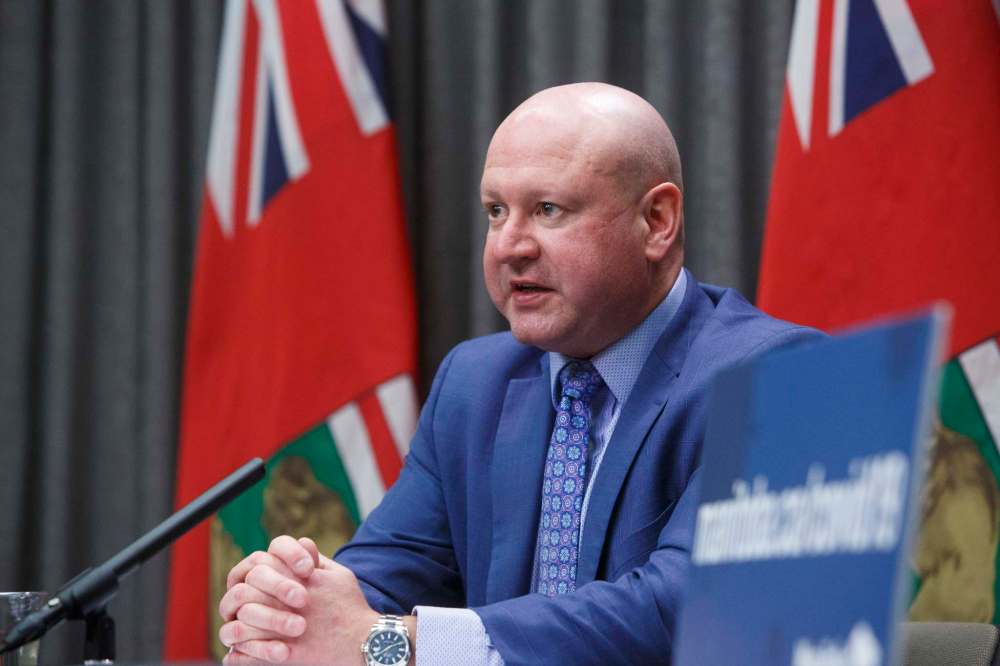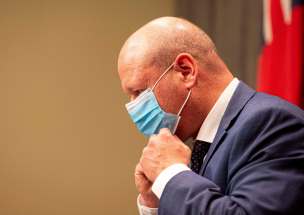Keep calm, mask on
Read this article for free:
or
Already have an account? Log in here »
To continue reading, please subscribe:
Monthly Digital Subscription
$0 for the first 4 weeks*
- Enjoy unlimited reading on winnipegfreepress.com
- Read the E-Edition, our digital replica newspaper
- Access News Break, our award-winning app
- Play interactive puzzles
*No charge for 4 weeks then price increases to the regular rate of $19.00 plus GST every four weeks. Offer available to new and qualified returning subscribers only. Cancel any time.
Monthly Digital Subscription
$4.75/week*
- Enjoy unlimited reading on winnipegfreepress.com
- Read the E-Edition, our digital replica newspaper
- Access News Break, our award-winning app
- Play interactive puzzles
*Billed as $19 plus GST every four weeks. Cancel any time.
To continue reading, please subscribe:
Add Free Press access to your Brandon Sun subscription for only an additional
$1 for the first 4 weeks*
*Your next subscription payment will increase by $1.00 and you will be charged $16.99 plus GST for four weeks. After four weeks, your payment will increase to $23.99 plus GST every four weeks.
Read unlimited articles for free today:
or
Already have an account? Log in here »
Hey there, time traveller!
This article was published 28/07/2021 (1593 days ago), so information in it may no longer be current.
The masks must stay.
As Manitoba makes significant progress in mitigating the third wave of COVID-19, and the government plots the further lifting of social and economic restrictions, we must not lose sight of the fact the threat from this deadly virus has not disappeared.
Even as we regain freedoms lost for extended period of time while the novel coronavirus ravaged the province, we need to demonstrate the moral and political strength to leave some measures in place.
Non-medical face masks certainly fall into the category of things needed to guard against future waves of COVID-19.
Almost 18 long months into the pandemic, there is little scientific debate about whether mask mandates for all indoor spaces is effective at controlling the spread of the virus and its variants. Social distancing and limiting the number of people who can gather have played a role as well, but no one virus-fighting tool has done as much.
A nationally recognized epidemiologist characterized non-medical masks as “the least intrusive, most-effective tool we’ve had to battle COVID-19.”
In a phone conversation this week, a nationally recognized epidemiologist characterized non-medical masks as “the least intrusive, most-effective tool we’ve had to battle COVID-19.”
However, even with the combined weight of scientific and anecdotal evidence supporting continued use, many jurisdictions have decided to eliminate mask mandates.
The results have been worrisome.
Alberta, which decided to lift almost all its restrictions on Canada Day, is suffering through a resurgence. This week, the western province once again reached more than 1,000 active COVID-19 cases. Of greater concern is the R-value (epidemiological calculation of how many people a single positive case can infect) rising as well.
Alberta is hardly alone in seeing trend lines move in the wrong direction.
In the United States, the 14-day average for new infections has risen 145 per cent. In some states that lifted mandatory mask orders, along with other restrictions — Florida, Louisiana and Mississippi — new infections are up roughly 300 per cent.

Based on rising case counts and new concerns about the ability of fully vaccinated people to become infected and pass the virus to others, the U.S. Centers for Disease Control and Prevention this week recommended mandatory public mask use for anyone living in an area with high levels of transmission.
What of Manitoba? Over the last month, it has taken a decidedly iterative approach to the lifting of restrictions. Residents are now able to go to more places, in greater numbers, than at any time since last fall. To the credit of the premier and his advisers, mandatory mask use indoors has remained.
Can Manitoba maintain its steady, cautious and scientifically sensible approach and keep its mask mandate in place?
Past experience tells us when Premier Brian Pallister and company are given the choice between going too fast, too far or taking a more restrained approach, the former almost always wins out. Recent comments by Dr. Brent Roussin, chief provincial public health officer, suggest Manitoba hasn’t quite lost its taste for throwing caution to the wind.
In the first week of July, Roussin was widely quoted as saying with the growth in the number of Manitobans who have been fully vaccinated, “this pandemic’s days are numbered.” It was a startling claim, particularly since Roussin knows as well as anyone higher vaccination rates, on their own, will not “end” the pandemic.
It’s extremely unlikely we’ll see an end to the global pandemic until the virus is contained and eradicated.
The more people who get fully vaccinated, the safer we’ll all be. But it’s extremely unlikely we’ll see an end to the global pandemic until the virus is contained and eradicated. Particularly if, as epidemiologists believe, it will continue mutating and presenting new threats.
It is for exactly those reasons — uncertainty about the total number of people who will become fully vaccinated and the evolving nature of the virus — masks are so important. Not a perfect tool, but pretty darn close.
Face coverings can be unworkable in any settings where the consumption of food or beverages are part of the experience: bars, restaurants, sporting and cultural events, movie houses. But in almost all other indoor scenarios (churches, fitness centres, transit, shopping, offices, schools, museums and galleries, libraries and health-care facilities), they are not only workable, they’re essential
The slow, iterative reopening in Manitoba has been a bright spot in an otherwise tattered pandemic response, a sign political and public health leaders may have learned important lessons about moving too far, too quickly. It is important to remember, however, those lessons came at the expense of thousands of new cases and hundreds of unnecessary deaths.
Still, save for a couple of missteps, it’s been working.
Manitoba’s daily counts on new cases, deaths and hospitalizations have fallen steadily. Pallister and public health advisers shouldn’t really need any more proof what they’re doing now is working — and they should keep taking the same type of approach well into the future.
All we need is the intestinal fortitude.
dan.lett@freepress.mb.ca

Born and raised in and around Toronto, Dan Lett came to Winnipeg in 1986, less than a year out of journalism school with a lifelong dream to be a newspaper reporter.
Our newsroom depends on a growing audience of readers to power our journalism. If you are not a paid reader, please consider becoming a subscriber.
Our newsroom depends on its audience of readers to power our journalism. Thank you for your support.






